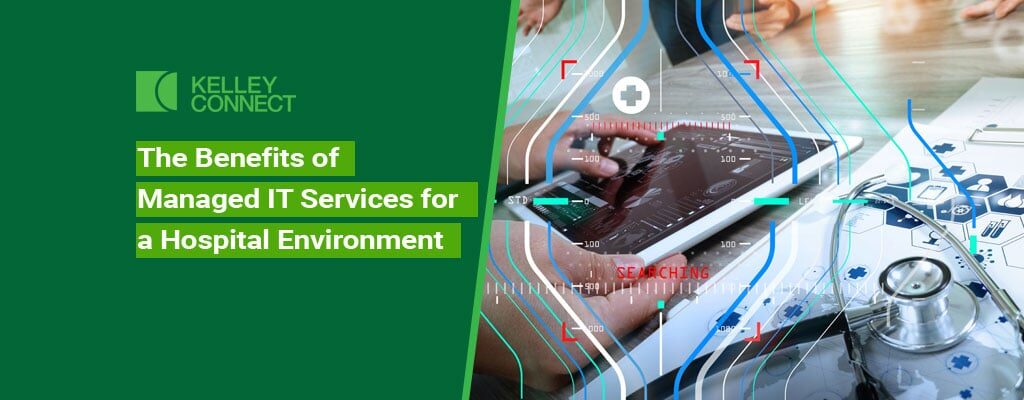The Benefits of Managed IT Services for a Hospital Environment
Contents
Managing IT services for hospitals can be costly and time-consuming. From HIPAA compliance to cybersecurity, IT administration today requires an exceptional level of know-how and expertise.
Fortunately, many hospital IT services can help by streamlining processes, improving workflows, enabling collaboration, and enhancing security. All of this can be done while offering significant cost savings.
Why Hospitals Need Managed IT Services
Healthcare service providers can benefit tremendously from managed IT services. The term “managed IT services” refers to the practice of outsourcing IT operations to a qualified third-party vendor. Instead of just calling upon an outside IT provider when something has been broken and needs urgent repair, a managed IT services provider offers proactive tech support, preventative maintenance, and ongoing technology services.
What Makes Managed IT Different in Hospitals?
Technology has transformed healthcare in many positive ways. At its best, modern technology provides better treatment options, improved communication between doctors, patients, and specialists, and streamlined billing.
However, technology also places tremendous burdens on healthcare service providers. Complying with state and federal regulations can be tremendously burdensome, putting a strain on staff and resources. Technology systems also need to be highly reliable, especially as hospitals, doctor’s offices, and healthcare providers rely on electronic scheduling and check-ins.
Security is incredibly important, and yet, cyberattacks are on the rise worldwide. For hospitals and healthcare providers, cybersecurity has to be paramount – lives are literally at stake. Unfortunately, personal health information (PHI) is a top target of hackers.
HIPAA Compliance and Other Legal Obligations
HIPAA (the Health Insurance Portability and Accountability Act), signed into law by Bill Clinton in 1996, has specific regulatory requirements regarding patient health information. The Privacy Rule requires healthcare providers to protect personal health information in all forms, including physical and electronic.
Also required under federal law is the Security Rule, which applies to digital or electronic health information. All electronic documentation and digital files must be secure, and this may require unique data encryption processes and other advanced IT security measures.
Keeping up with the latest state and federal rules and regulations can be cumbersome. One of the benefits of a managed IT services provider is that the vendor will stay on top of these laws and regulations. That is one of the advanced services we offer here at Kelley Create.
How Managed IT Services Provide Cost Savings
Healthcare organizations are often struggling to accomplish a lot on limited budgets. But no matter what is going on with the budget from year to year, the healthcare service provider must still offer the highest quality of service while continuing to meet regulatory requirements.
Furthermore, recruiting, hiring, and maintaining IT staff is costly. This does not include the training and continuing education required to keep IT staff up to date on technologies and regulations affecting healthcare.
Managed IT services that are geared specifically towards healthcare providers take care of a lot of the tech headaches for you. From keeping up with regulations such as managing HIPAA cybersecurity, a qualified managed it support services can make a positive impact on a hospital or healthcare provider’s budget.
In fact, managed IT services make budgeting for IT easier since you’ll know ahead of time what your costs are going to be and can plan accordingly.
Connect and Collaborate Securely Instead of Being Stuck in a Data Silo
Managed IT services can provide critical systems to enable cross-collaboration between doctors, departments, and other health providers.
With the right HIPAA-compliant digital infrastructure, such communication can be secure and more convenient. Encryption and secure cloud access can provide ways for healthcare staff to share appropriate patient information, lab results, and other records to enable proper diagnosis and treatment.
Professional IT Services for Hospitals
Kelley Create understands the technology needs of hospitals and healthcare service providers. One of our specialties is the Xerox Healthcare Multifunction printer solution. Our Xerox Healthcare Multifunction Printer Solution improves workflows while offering seamless sharing across a HIPAA-compliant network.
Our Xerox healthcare solution offers integration with Kno2, the country’s largest, most secure health information exchange. With improved access, on-demand data, and advanced patient data routing, this robust system can positively impact healthcare operations – all while saving costs.
Kelley Create provides a full range of IT services for hospitals and healthcare organizations customized to your needs. To learn more about how we can help your organization save time and money, contact us today.



